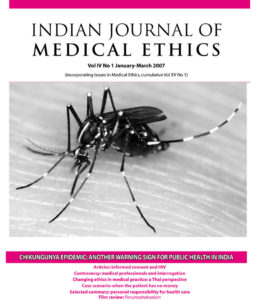
The concept of voluntary informed consent is central to discussions of medicalethics today. Treatment or research must take place only after consent; people must get complete information, and they must be in a position to volunteer, and should not be coerced. Yet many questions are raised about the quality ofconsent in medical practice and research. The editorial discusses the HlVvaccinetrials in India. A survey of obstetricians in Kerala finds that pregnant womenare routinely tested for HIV without their consent.A study of informed consentin a trial in Nigeria for HIV drugs finds that many participants believed thatthey would be refused care if they withdrew from the research. And a surveyof patients’ understanding of medical information finds that patients feel theyoften receive too little medical information to make informed decisions.
It was only natural that the October 2007 editorial on medical professionalsand narco analysis should generate a response. We encourage these responsesand carry them, as well as the editorial writer’s reply. We hope such exchangesstimulate further debate on the subject.
If the private sector cashed in on the Chikungunya panic, the public healthsystem didn’t do much either; it neithertold people howto protect themselves nor took steps to stop the breeding of mosquitoes. A doctor working in a tribal area where mosquito-borne diseases are endemic puts these responses in the context of the dismal state of public health in India, and calls on health professionals to accept their responsibilities.
Medical tourism has transformed the character of medical practice in Thailand, argues an anthropologist.
A case study presentation from the US discusses the conflicts, for a medical professional, when the patient needs a type of treatment but insurance will not pay. How is the doctor to resolve this situation? This is accompanied by a commentary on the Indian context.
Also related to the patient-insurance tension, the selected summary discussesa debate in the US on the move to blame the patient for his or her health problems.
In this issue, we carry the concept note of the Indian Journal of Medical Ethics’ Second National Bioethics Conference to be held on December 6-8,2007.
Cover : Mosquito-borne diseases are a major public health problem
